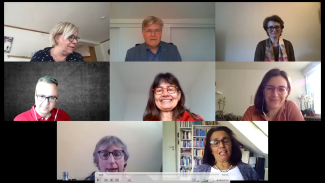Teaching International Groups Online – Using English as a Lingua Franca and being good at it!
In line with pillar 3 of the Bienvenue en France label, dedicated to skills of internationalisation, Paris-Saclay University organised a series of in-training courses to give academics the intercultural tools and know-how to teach international groups online. Following the success of the first editions, and the high demand among academics for help in this area, the course was developed and opened to members of the EUGLOH alliance.
Paris-Saclay University was awarded the Bienvenue en France label at the beginning of the year by Campus France, the French National Agency for Promotion of Higher Education. The aim of the label is to improve the tools and initiatives established by French HEIs for international students. More specifically, the third strategic pillar aims at upscaling language and intercultural training at the university as a whole.
It is no secret that teaching an international group of students with different backgrounds, whether they be linguistic, cultural or even academic – what is more in a language which is not your mother-tongue – can be a daunting prospect. In order to help staff at Paris-Saclay University who were opening new academic scientific courses in English, the Internationalisation at Home and Interculturality team invited 2 authors of the blended learning course “International Communication in English” for a first training session in June 2020. English-language teachers of the University had already been trained by the same team a year earlier.
Then, the pandemic struck, and with the dual challenge of teaching in English and online in mind, Rudi Camerer and Judith Mader from ELC – European Language Competence, adjusted their programme to fit the new constraints. Along with Vera Dickman and Carmel Keane-Davies, from the Internationalisation and Interculturality team of Paris-Saclay University, the course was then adapted to the staff of the university and the EUGLOH alliance. Five of the courses were also taught by Vera Dickman and Annick Manco of the Institut d'Optique Graduate School (IOGS, Paris-Saclay) within the framework of the International Engagement programme, created by the I@H and Interculturality team under Cross-Curricular Education, offering academic and administrative staff seminars and workshops in French and English. This offered staff a space to discuss aspects of internationalisation, lifting the taboo about how comfortable – or uncomfortable – everyone felt about teaching or speaking in English. The first to participate in the fully online course they organised, ”Teaching International Groups Online”, were staff from the faculty of Pharmacy. In light of the success and the growing demand, further sessions were offered, reaching staff from different departments and research areas.
Simultaneously, members of the EUGLOH alliance were urgently looking for language programmes to help their own staff in online teaching in English. The sessions were thus naturally opened to the alliance, bringing in a lot of interest (60 people registered for 20 available seats in the first course!). As a result, over 100 staff with partner universities Lund University, Porto University and Ludwig-Maximilians-Universität München have been able to benefit from the course, also creating new bonds with staff from partner universities, with the potential for the development of further actions, such as inviting one another to talk in their lectures.
At the beginning of the course, participants were asked to try and define culture and to understand how our culture can impact our expectations, both for teachers and learners, but also how stereotypes can influence the way we interact. When we use English as an international language, our mother-tongue has an influence on our body language and code in English. The ultimate aim is to help teachers maintain trust in a teaching and learning context by improving their intercultural use of the language.
Vera Dickman, Interculturality Coordinator and Associate Professor at Paris-Saclay University, and one of the organisers of the series of courses, explains: “By ‘maintaining trust’, what is implied is the awareness of intercultural skills such as using non-judgmental language and attitudes of openness, adaptability, flexibility, and inclusiveness. Teachers must aim to create a sense of belonging to the group online while valuing the diversity as well as the individual so that one is not interacting with a ‘Chinese student’ but with Li Zhang who loves to DJ in his spare time and could be renamed DJ Zhang on his Zoom page.”
As such, the Teaching International Groups Online course is an intercultural awareness course on using English as a lingua franca – ELF – and not as a "foreign language", or EFL, where language mistakes are penalised or seen as penalising. It is important to sensitise staff to the experience that students may be having.
In the light of the success of this first series, and the number of registrations, 3 further sessions should be organised over the coming months and hopefully over the next academic year. One participant said she had never had such a great training course in her life – and this was an online course, so that says it all!


